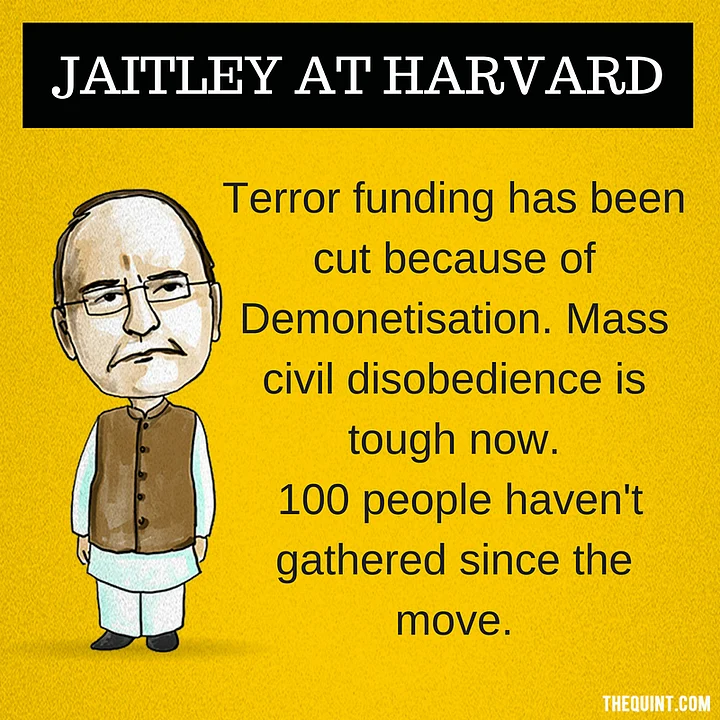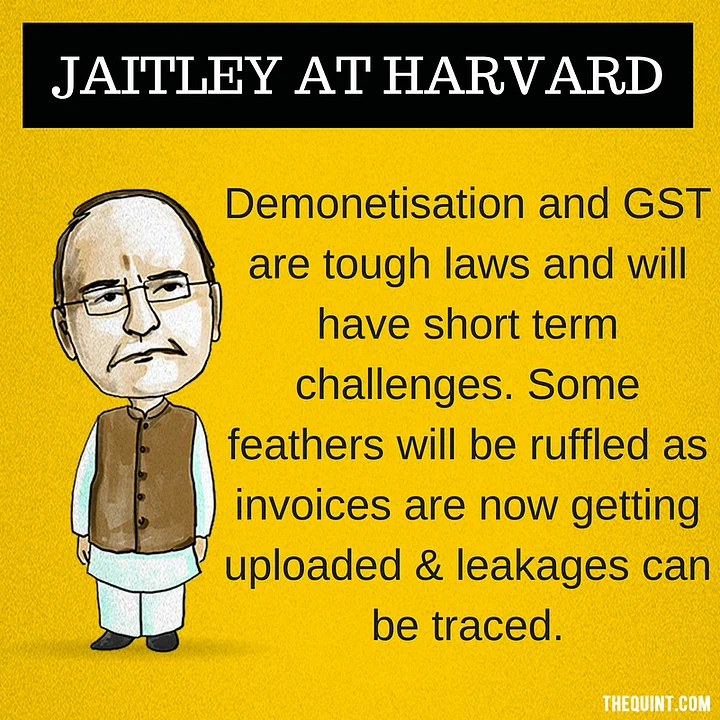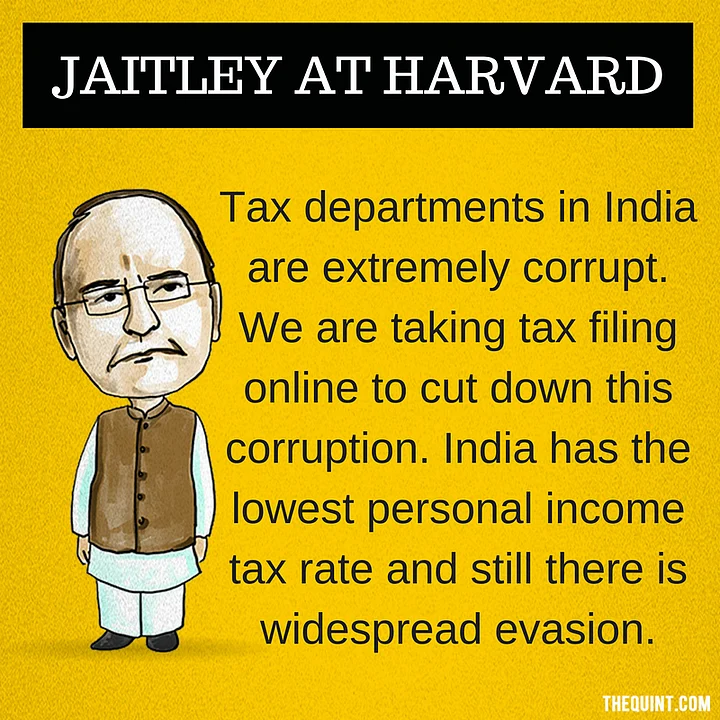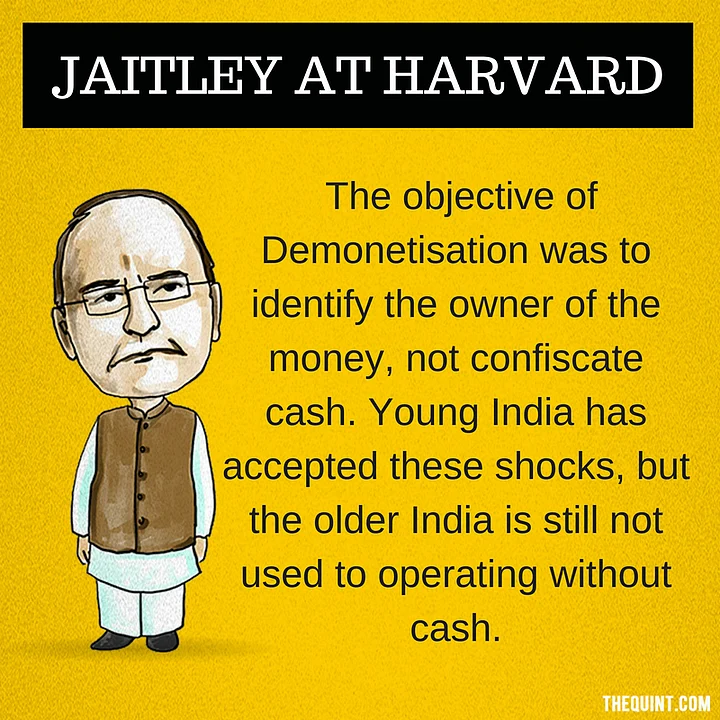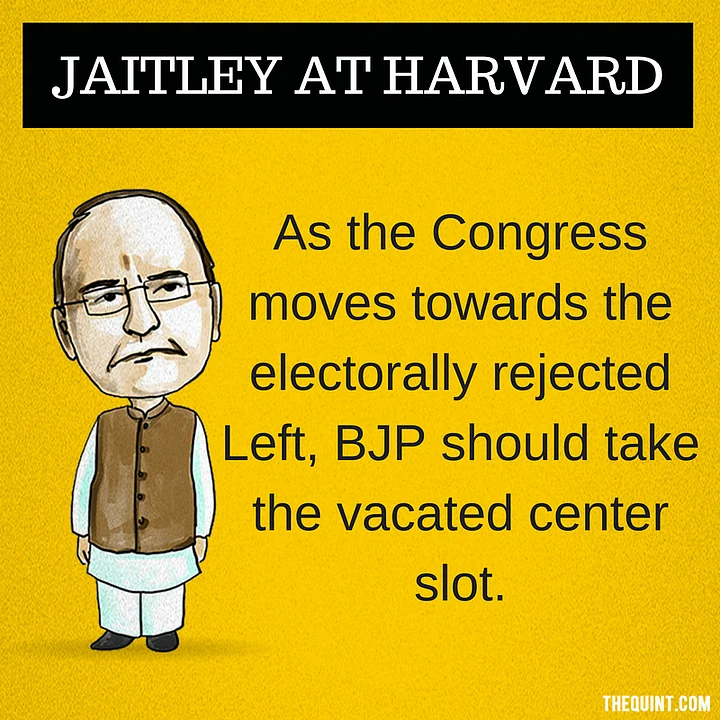(The article is based on author’s interaction with the finance minister Arun Jaitley at Harvard University and reflects his personal views.)
It’s not everyday that you get to have an intimate discussion with your country’s finance minister. There had been a lot of build-up at the Harvard University over the last couple of days. The student community and professors were all waiting to hear about the ongoing reform process in India and its resulting impact on our country’s economy.
This lecture was also significant as it was coming at the backdrop of two significant events.
- First, Rahul Gandhi’s recently concluded US tour where he had lashed out the economic policies of the current government.
- Second, last week’s 22nd GST council meet which announced wholesale changes to GST after discontent expressed by traders and small business owners.
BJP Can Occupy the Centrist Space
From the time he entered the Loeb House with his delegation that included Indian Ambassador to United States Navtej Sarna and a bunch of bureaucrats from the finance ministry, Jaitley seemed to be in a sombre mood. The stress was visible on his face and it seemed that something was bothering him.
During the cocktail reception, he told me that as the Congress is moving towards the Left, the BJP has a massive opportunity to occupy the centrist space in the Indian political spectrum.
He went on to add that the BJP already takes a centrist stand on economic issues and that politically it will be useful to do the same for social issues. This was in response to the question on recent social unrest in the country.
During the next half-an-hour, he answered questions related to the overreach of judiciary, right to privacy and careers in politics but the underlying theme for the evening was that he was dismissive and defensive. Maybe, he was mirroring the current mood of his government in New Delhi.
Also Read: Is India Morphing from a ‘Salad Bowl’ to a ‘Melting Pot’?
UPA Govt to be Faulted for Sluggish Growth
The action then shifted to his lecture on ‘India’s tax reforms’. He seemed more at ease delivering a monologue from the podium where he talked about the problem of shadow economy and the steps taken by his government to curb this menace.
The finance minister stressed on the fact that his government is trying to define the new normal and that the discomfort caused by these reforms will just have transitory impact on the lives of the people.
He also emphasised that the sluggish growth was a result of mismanagement by the erstwhile UPA government. He explained that the financial slowdown was a result of reckless lending by banks that led to the creation of excess capacity coupled with the global fall in commodity prices.
He added that GST had nothing to do with the reduction in GDP as it was successful in ensuring faster and corruption-free movement of goods across the country.
Also Read: Shouldn’t Decisions Like Demonetisation Have Parliament’s Stamp?
In Defence of Demonetisation
Then came the time to address the elephant in the room. Jaitley said that demonetisation’s aim was not to confiscate money but to identify the owner of the money in circulation. He hailed the scheme as a great success in curbing terror funding in Kashmir and in Maoist-dominated areas.
Most people in the room didn’t agree with his assessment and were perplexed by the oversimplification of his reasoning.
It was brave of him to take questions from the audience despite knowing the fact that he would not get the sympathy of the crowd. He stood his ground and vehemently defended the policies of his government like a true foot soldier. Overall, this lecture failed to lift the dampened spirits of academicians and policy students. Jaitley could have shared his plans to revive the economy but that can only happen once he agrees that there is a problem in the first place.
(Prateek Kanwal is a graduate student at the Harvard University and is also the Founder of Citizens for Public Leadership. He can be reached @prateekkanwal. This is an opinion piece and the views expressed above are the author’s own. The Quint neither endorses nor is responsible for the same.)
(Breathe In, Breathe Out: Are you finding it tough to breathe polluted air? Join hands with FIT in partnership with #MyRightToBreathe to find a solution to pollution. Send in your suggestions to fit@thequint.com or WhatsApp @ +919999008335))
(At The Quint, we question everything. Play an active role in shaping our journalism by becoming a member today.)

